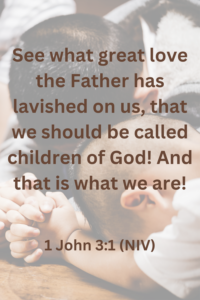
In a world that often leaves us feeling abandoned and alone, the concept of an “orphan mindset” is a powerful metaphor for the spiritual and emotional alienation many experience. This feeling of being spiritually orphaned can create a sense of detachment, insecurity, and worthlessness. However, the transformative power of God’s love as a Father offers a path from orphan to child of God, inviting us to embrace our true identity and belonging in God’s family.

John 1:12 (NIV): “Yet to all who did receive him, to those who believed in his name, he gave the right to become children of God.”
Understanding the Orphan Mindset
The orphan mindset is not just about physical abandonment; it is a state of heart and mind where we feel isolated, unloved, and unworthy. This mindset can manifest in various ways, including:
- Insecurity and uncertainty: A constant feeling of not being good enough or fearing rejection.
- Isolation: Avoiding relationships or community due to fear of being hurt.
- Mistrust: Lacking the feeling of belonging and always searching for a place to fit in.
- Self-Reliance: Believing that you must do everything on your own because no one else will help you.
- Perfectionism: Striving to earn approval and love through achievements, success and performance.
These manifestations stem from a deeper longing for acceptance, love, and belonging.
Take a moment to think about Queen Esther as a child. Esther 2:7 explains that Esther had been orphaned as a child and adopted by Mordecai, a relative who had been carried off from Jerusalem as a captive. So, Esther was an orphaned Jewish girl in a foreign land then adopted by a relative who was also living in a foreign land because of captivity. Talk about generational trauma in insecurity, uncertainty, isolation, mistrust.
Add to all of this that Esther was beautiful and “lovely to look at”. This just adds to the perfectionism image that young Esther faced. As a result of her beauty, she was taken to the king’s palace to become part of his harem, facing the uncertainty and fear of her new role. Esther 2 describes how it took a young woman an entire year of preparation to spend one night with a king, who may or may not be pleased with her. Could you imagine the fear of rejection mounting in that year of preparation for the already orphaned Esther?
Esther is chosen as queen, but Esther’s saga continues when the evil Haman plots against the Jewish people in Esther 3. Later in the book of Esther, Haman targets Mordecai in an attempt to kill him, and Mordecai gave Esther a plea to approach the king to save the Jewish people. Esther’s response was filled with the orphan mindset when she replied in Esther 4:11, “All the king’s servants and the people of the king’s provinces know that if any man or woman goes to the king inside the inner court without being called, there is but one law–to be put to death, except the one to whom the king holds out the golden scepter so that he may live. But as for me, I have not been called to come in to the king these thirty days.”
Ultimately, Queen Esther does not trust the king to extend the scepter to her. She still harbors insecurity, uncertainty, and mistrust. Only after Mordecai reminds her of her true insecurity as a Jew, she dresses herself in faith and courage to risk her life to save her people. As a result, she embraces her role as queen and approaches the king. The king shows his unconditional love to Queen Esther when he not only extends the scepter but allows an edict to be sent to save the Jewish people.
From Orphan to Child of God: God’s Fatherly Love

The only antidote to transform from orphan to child of God is to embrace God’s fatherly love. The Bible is rich with imagery and verses that depict God as a loving Father who desires a close relationship with His children. Consider these powerful scriptures:
1 John 3:1 (NIV): “See what great love the Father has lavished on us, that we should be called children of God! And that is what we are!”
Romans 8:15 (NIV): “The Spirit you received does not make you slaves, so that you live in fear again; rather, the Spirit you received brought about your adoption to sonship. And by him we cry, ‘Abba, Father.'”
These verses remind us that God’s love is not conditional; it is lavished upon us, inviting us to embrace our identity as His beloved children. God’s love as Father includes extending a scepter, saving a people, and covering the orphan mindset.
From Orphan to Child of God: Embrace Your Identity
Transforming from an orphan to child of God involves several key steps:
1. Accept and receive: Accept that you are loved unconditionally by God and receive God’s love as Father. This can be a difficult step, especially if you have been deeply wounded or have experienced rejection. Focus on scriptures that affirm God’s love and let them penetrate your heart. Put away the orphan mindset and place your faith in God as a loving, caring Father whom you can truly trust.
2. Prayer and Relationship: Develop a personal relationship with God through prayer. Speak to Him as your Father. Share your fears, hopes, and dreams. Allow yourself to be vulnerable in His presence.
3. Community: Surround yourself with a supportive faith community. Engage in fellowship with other believers who can encourage and uplift you. The church is a family, and being part of it can help reinforce your identity as a child of God.
4. Healing and Forgiveness: Seek healing for past wounds and forgiveness for any bitterness or anger you may hold. This can often involve counseling, prayer, and sometimes professional help. Remember, healing is a journey, not a destination.
5. Identity in Christ: Regularly remind yourself of who you are in Christ. You are not defined by your past or your mistakes. You are a new creation, loved and valued by God.
Remembering Jesus’ plan for your life will help you through the journey from orphan to child of God. In John 14:6-7, Jesus says, “I am the way, and the truth, and the life. No one comes to the Father except through me. If you had known me, you would have known my Father also. From now on you do know him and have seen him.” The plan has always been that you would transform from orphan to child of God through Jesus’ death and resurrection.
Living as a Child of God
Once you embrace your identity as a child of God, your life will begin to transform. You will experience security, knowing that your worth is not based on performance but on God’s unwavering love. You will find peace, resting in the assurance that you are never alone; God is always with you. Understanding that you have a unique role in God’s plan will give your life meaning and direction. Moreover, you will experience the joy that comes from a deep, personal relationship with your Heavenly Father.
The journey from an orphan to child of God is transformative. It involves accepting God’s love, building a relationship with Him, and embracing your new identity in Christ. As you take these steps, you will find healing, purpose, and joy in the arms of your loving Father. Remember, you are no longer an orphan; you are a cherished child of God.
Join us on a 30-Day Faith Journey
Follow us on Pinterest for more Bible Study topics
